Top 10 AI Enterprise Search Tools to Boost Productivity in 2025
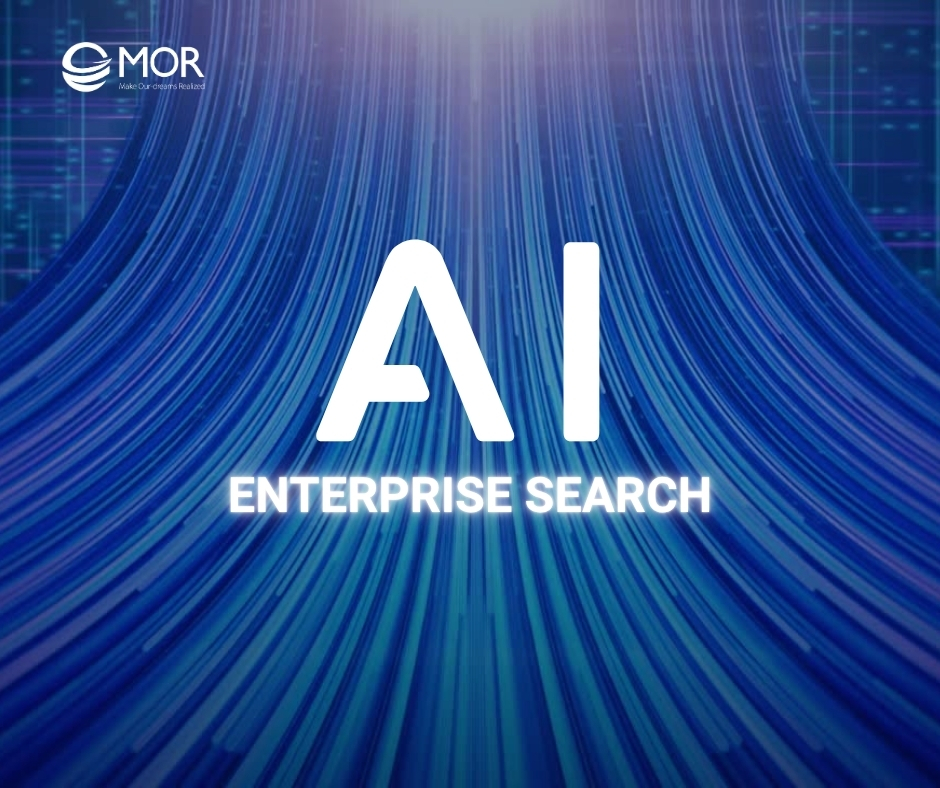
Finding the right document shouldn’t take longer than using it. But with disconnected systems, scattered files, and vague search tools, it often does. That’s where AI enterprise search changes the game. This MOR Software’s guide breaks down what it is, how it works, and why it’s becoming a must-have for growing teams looking to stay focused and fast.
Understanding AI Enterprise Search
Searching company files used to mean guessing filenames and clicking through endless folders. Not anymore. Modern software search powered by AI helps teams find exactly what they need, even if they don’t know the right keywords.
McKinsey estimates that the average knowledge worker still spends about 1.8 hours a day, or 9.3 hours each week, hunting for information, while IDC puts the figure closer to 2.5 hours, highlighting the scale of the problem smart search can solve.
Think of it as an ‘answer engine’ that understands human language, respects access rules, and learns from behavior over time. Instead of just matching keywords, it understands meaning. It connects chats, documents, apps, and databases. And it gets better the more people use it.
Analysts expect the enterprise-search market to add about USD 3.6 billion in new value between 2024 and 2028, with total market size projected in the USD 6.9 billion to USD 8.8 billion range by 2030.
What Is AI Enterprise Search?
AI enterprise search combines artificial intelligence, machine learning, and natural language processing (NLP) to find the most relevant answers across all company systems Today’s enterprise search engines can surface everything from CRM records to Zoom transcripts in seconds.
That reach matters because up to 80% of new corporate data is unstructured, according to Gartner and other analysts. It handles unstructured and structured data together.
This means you’re not just searching file names or exact terms. The system interprets what you mean, then finds the right data, even if it lives in a chat thread, an email, or a CRM record.
Let’s say a sales rep is preparing for a client pitch in Tokyo. They type “Q1 Japan pricing deck” into the company’s internal search bar. The file they’re looking for is actually called “FY2025_MarketOutlook_APAC_v2.pdf.”
The AI picks it up anyway, based on the location, quarter, and user behavior. That’s what makes an AI powered enterprise search smarter than anything that came before it.
Difference Between Enterprise Search and Web Search
Here’s how enterprise search ai differs from the public tools we use every day:
| Category | Web Search | Enterprise Search AI |
| Data Sources | Crawls and indexes public internet pages. | Scans private company data like emails, chats, docs, databases, and internal tools. |
| Permissions | Everyone sees the same results. | Results vary based on user roles and access rights. |
| Search Goals | Returns links to external content. | Delivers direct answers from internal systems, often in the form of summaries or snippets. |
| Relevance | Ranks results based on SEO, backlinks, and general popularity. | Ranks results based on company-specific data, usage patterns, and business context. |
Let’s say you search “product roadmap” on Google. You’ll get blog posts, videos, or someone else’s slides. Search that in an ai driven enterprise search system and it pulls up your team’s internal plan, Jira board, or last week’s strategy call notes. Same phrase, completely different result.
Tools like Google also continue evolving, with AI in Google Search now summarizing results and anticipating queries. But unlike public tools, enterprise systems return personalized, secure answers behind the firewall.
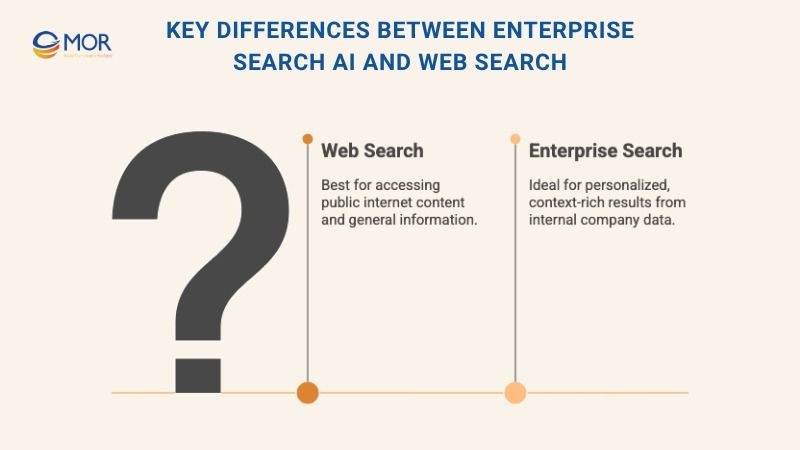
Difference Between Enterprise Search and Web Search
Must-Have Features in an AI Enterprise Search Platform
A solid enterprise AI search solution should do more than ‘search.’ It should understand, prioritize, and protect your data. Look for tools that include:
- Natural language processing (NLP): Lets users type questions the way they speak. No need to remember exact terms or formats. Makes search easier across teams.
- Retrieval-augmented generation (RAG) and vector search: Uses AI to interpret meaning, not just keywords. Vector search finds similar content, even if phrasing is different. RAG pulls structured answers from internal documents.
- Real-time data freshness and indexing: Updates and syncs data constantly. You won’t be working off last week’s version or missing newly added files.
- Role-based access control and privacy compliance: Only shows users what they’re allowed to see, and IBM’s 2024 Cost of a Data Breach report shows companies that apply security AI and automation save an average of USD 2.22 million per breach.
- Integration with business and collaboration apps: Works across platforms your team already uses. No more switching tabs just to look for a single number.
- Analytics to track usage, gaps, and ROI: Admins can monitor what’s being searched, what’s missing, and where to improve content.
- Personalization based on behavior and intent: Over time, the system learns what different users look for and tailors results accordingly.
The best enterprise search solutions don’t just organize your data. They make it accessible, actionable, and invisible in the background of your workflow. That’s what separates top-tier enterprise search products from outdated AI lookup tools.
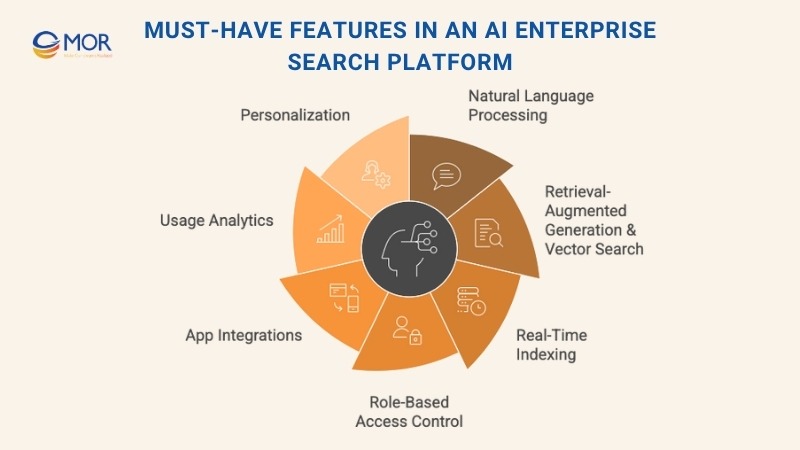
Must-Have Features in an AI Enterprise Search Platform
Key Benefits of Using AI Enterprise Search
We’ll look at how AI enterprise search helps real teams work smarter. From cutting down tool-hopping to speeding up onboarding, these are the practical wins that show up fast.
Breaks down silos across teams and departments
When information lives in isolated systems, decisions stall. AI enterprise search connects documents, conversations, and tools across the company so everyone gets the full picture.
Helps users find what they need faster
Typing a vague phrase like “contract renewal policy” still brings back the exact doc, even if it was buried in a shared drive from last year. Search works how people think, not how data is stored.
Improves onboarding, support, and collaboration
New hires or support agents can find past discussions, files, and project history without needing to ask someone. That shortens ramp-up time and builds confidence from day one.
Reduces time wasted switching between tools
Jumping from Slack to Google Drive to SharePoint kills productivity. A strong AI powered enterprise search tool brings everything together in one query, saving hours per week.
Supports better decision-making across roles
Product managers get historical feedback. Sales teams get previous quotes. Legal gets version history. Everyone moves faster because they have the full story.
Teams using AI search report higher productivity
According to Slack’s State of Work 2023, 90% of knowledge workers using AI report higher output and faster decisions. That’s not just convenient. That’s measurable value.
When teams stop guessing and start finding, work speeds up. That’s what enterprise search solutions are built for. It’s not about searching more. It’s about finding faster, with less friction.
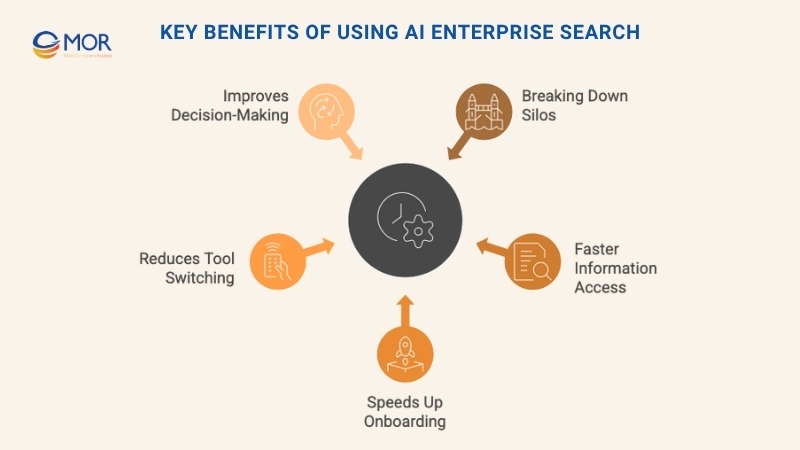
Key Benefits of Using AI Enterprise Search
10 Best AI Enterprise Search Tools for 2025
Below are the platforms that stand out for speed, relevance, and productivity gains. Each mini-review highlights core capabilities, typical use cases, and a quick note on why teams become more efficient after adopting the tool.
1. Slack Enterprise Search
Slack Enterprise Search extends the platform’s familiar workspace into a unified, AI-powered knowledge hub. By indexing messages, files, and third-party repositories, it surfaces precise answers, not just links, through natural-language queries directly in the command bar or any channel.
Deployment: Available as a native add-on for Slack Business+ and Enterprise Grid. Admins connect data sources (Google Drive, Confluence, Jira, Salesforce, etc.) via Slack’s Enterprise Search API.
Key features:
- Generative answers – Large-language-model (LLM) summaries cite the exact conversations or docs.
- Permission-aware results – Honors Slack workspace, channel, and app-level security.
- In-context actions – One-click to share, bookmark, or launch a huddle with the SME who authored the source.
- Insightful analytics – Dashboards reveal top searched terms and content gaps.
Pricing:
| Plan | Price (USD) | Included queries |
| Grid | $12 user/mo | 20 GB index / user |
| Add-on | +$3 user/mo | Unlimited sources |
Integrations: Native connectors for Atlassian, Microsoft 365, Box, GitHub, Zendesk, ServiceNow; open SDK for custom data lakes.
Pros (G2):
- Seamless inside Slack UI
- Zero-config security inheritance
- Quick adoption for non-tech users
Cons:
- No on-prem deploy option
- Advanced analytics only on Grid tier
Best for: Remote-first organizations already living in Slack that need “answer-in-one-slash-command” speed without migrating data.
2. Coveo
Coveo is a cloud-native, AI enterprise search and recommendations engine that unifies content across CRM, CMS, e-commerce, and help-desk systems to deliver hyper-personalized relevancy.
Deployment: Fully managed SaaS (AWS) with region selection and SOC 2 Type II compliance.
Key features:
- Vector + keyword fusion for neural and lexical recall
- Behavioral analytics & A/B testing with no-code tuning
- Headless & React UI kits for rapid widget rollout
- Relevance pipelines with ML-powered query intent detection
Pricing:
- Pro: up to 100 k queries/mo, 3 cloud connectors
- Enterprise: unlimited connectors, negotiated volume
Integrations: Out-of-the-box connectors for Salesforce, Adobe, ServiceNow; REST / GraphQL APIs for custom sources.
Pros:
- Fast connector setup
- Rich dashboarding (conversion, click-through)
- Responsive success team
Cons:
- Backend configuration can be complex
- Pricing transparency for mid-market tiers is limited
Best for: E-commerce and support teams seeking measurable uplift in conversion or self-service deflection without heavy DevOps overhead.
3. Algolia
Algolia offers real-time, typo-tolerant search-as-you-type with advanced analytics and A/B tests, powering over 17 K global apps.
Deployment: SaaS on multi-cloud (AWS, GCP, Azure) or dedicated VPC.
Key features:
- Instant search & autocomplete <50 ms latency
- AI Ranking / Neural Search optional module
- Rules engine for merchandising or doc prioritization
- Analytics API with top-query insights
Pricing:
| Tier | Starting price | Included searches |
| Build | Free | 10 k/mo |
| Grow | $0.50 / 1 k | Pay-as-you-go |
| Premium | Quote | volume discount |
Integrations: Shopify, Magento, React, Vue, Angular, Salesforce Commerce Cloud.
Pros:
- Minutes to set up
- Collaborative relevance management
- Helpful support team
Cons:
- Feature set can overwhelm beginners
- Complex usage-based billing
Best for: Digital commerce and SaaS apps needing millisecond UX and flexible front-end SDKs.
4. Elastic Enterprise Search
Elastic Enterprise Search (EES) layers intuitive workplace and web search atop Elasticsearch, combining full-text, vector, and semantic capabilities.
Deployment: Self-hosted (on-prem/K8s) or Elastic Cloud.
Key features:
- Workplace Search with 50+ pre-built connectors
- App Search relevance tuning sliders
- Adaptive synonym suggestions from click signals
- Role-based security integrated with SAML/OIDC
Pricing (Elastic Cloud US-East):
- Standard: $95/mo
- Gold: $109/mo
- Platinum: $125/mo
- Enterprise: $175/mo
Integrations: Kibana visualizations, Beats/Logstash pipelines, AWS/GCP/Azure marketplace.
Pros:
- Scales horizontally via sharding
- Unified logs + search analytics in Kibana
- Open-source flexibility
Cons:
- Steeper learning curve for cluster ops
- JVM tuning required for peak performance
Best for: DevOps teams consolidating logs, metrics, and enterprise content into one search backbone.
5. IBM Watson Discovery
IBM Watson Discovery uses AI enterprise search powered by NLP and deep-learning retrieval to extract answers from PDFs, webpages, and databases at scale.
Deployment: IBM Cloud SaaS or Red Hat OpenShift on-prem.
Key features:
- Smart Document Understanding auto-labels complex layouts
- Generative answer synthesis via watsonx.ai LLMs
- Advanced filters & facets across structured/unstructured data
- Data privacy with field-level encryption + EU residency
Pricing:
- Plus: $500/mo (10 k docs + queries)
- Enterprise: $5 k/mo (100 k)
- Premium: custom
Integrations: Watsonx Assistant, Salesforce, SharePoint, custom connectors through App Connect.
Pros:
- Strong OCR & table extraction
- Fine-grained access control
- Enterprise-grade support
Cons:
- Subscription cost high for SMBs
- UI can feel dated compared to newer SaaS rivals
Best for: Financial, legal, and insurance firms needing precise extraction from long-form documents.
6. Meilisearch
Meilisearch is an open-source search engine focused on instant responses (under 50 ms) and developer-friendliness. It’s lightweight, self-hostable, and ideal for teams looking to embed powerful search with full control and no lock-in.
Deployment:
- Self-host (Docker, Kubernetes, or bare-metal) with a single binary
- Meilisearch Cloud (AWS-hosted, SOC2-compliant)
Key features:
- Vector + keyword search in one engine
- Built-in typo-tolerance and synonyms with no setup
- Faceting, filtering, and geo-search supported in a single query
- Multi-tenant indexes with scoped API keys
Pricing:
| Plan | Price | Storage | Queries |
| Community | Free | Self-host | Unlimited |
| Cloud Dev | $30/month | 1 GB | 250,000 |
| Cloud Pro | $300/month | 20 GB | 5 million |
Integrations: SDKs for JavaScript, Python, Go, Rust. Plugins for Nuxt, Next.js, Shopify. Automation via Zapier and Make.
Pros:
- Blazing fast and easy to deploy locally.
- Simple APIs and excellent documentation.
- Fully open source under Apache-2.0.
Cons:
- Lacks advanced admin dashboard like Algolia.
- Large indexes (>50GB) require clustering, still in beta.
Best for: Startups, side projects, or DevOps teams seeking performance, flexibility, and self-hosting on a budget.
7. Azure AI Search
Azure AI Search, formerly Azure Cognitive Search, offers search-as-a-service within the Microsoft ecosystem. It’s designed for enterprise scale and integrates seamlessly with Azure AI, OpenAI, and cognitive pipelines.
Deployment: Fully managed SaaS. Supports VNet, Private Link, and over 60+ Azure regions.
Key features:
- Cognitive pipeline: OCR, translation, key phrases, sentiment
- Hybrid retrieval: BM25 + OpenAI vector in one index
- AI Studio for building chatbots (RAG-ready)
- Built-in ETL: integrates with Azure Blob, SQL, and Cosmos DB
Pricing (US East):
| Tier | vCores | Storage | Price |
| Free | 3 | 50 MB | $0 |
| Basic | 1 | 2 GB | $73.73/mo |
| Standard S3 | 6 | 48 GB | $1,198/mo |
Integrations: Connects with Azure OpenAI, Power BI, Logic Apps, Synapse, Dynamics 365, SharePoint Online.
Pros:
- One-click deploy for Azure users.
- Strong security with AAD and RBAC.
- Great OCR and enrichment for scanned data.
Cons:
- Pricing climbs fast if you exceed query or storage limits.
- Admin UI is fairly basic.
Best for: Organizations already invested in Azure, looking for search and RAG without DevOps overhead.
8. Alltius
Alltius is a no-code AI enterprise search platform for creating AI Assistants that search and summarize internal content like documents, videos, and support tickets. It’s built for teams that need results fast, without machine learning expertise.
Deployment: SaaS (multi-tenant on AWS & GCP), SOC2 and GDPR compliant. Dedicated cloud available.
Key features:
- Bring-your-own-LLM: works with OpenAI, Claude, Cohere, LLama
- Multimodal input: PDF, MP4, CSV, web crawlers
- Guardrails: policies, profanity filters, hallucination limits
- Widgets for Slack, Teams, Intercom, Zendesk
Pricing:
| Plan | Pages | Queries | Price |
| Starter | 3,000 | 2,000 | $99/month |
| Growth | 20,000 | 15,000 | $499/month |
| Enterprise | Custom | Custom | Contact |
Integrations: Native connectors for Google Drive, Confluence, Notion, GitHub. Webhooks + REST API.
Pros:
- Super fast to deploy an FAQ assistant in under an hour.
- Nice stats like answer confidence and content gaps.
- No-code interface is easy to navigate.
Cons:
- Limited UI customization options.
- Depends on hosted vector storage backend.
Best for: Support, HR, and success teams who need internal/external chatbots fast without an ML team.
9. GoLinks
GoLinks replaces long URLs with short, memorable go links (e.g., go/finance) and adds AI-powered search across link destinations. It simplifies navigation and improves internal resource discovery.
Deployment: SaaS with U.S. and EU data residency. SAML SSO support.
Key features:
- Smart “go/” links with live search suggestions
- AI Answers sidebar that reads destination pages and replies
- Browser extension + Slack bot for instant access
- Admin analytics for top, broken, and underused links
Pricing:
| Plan | Users | Price |
| Free | Up to 20 | $0 |
| Pro | 21–500 | $4/user/month |
| Enterprise | 500+ | Custom pricing |
Integrations: Works with Chrome, Edge, Firefox, Slack, Teams, Okta, Google Workspace.
Pros:
- Easy to memorize and type, just go/payroll.
- SSO-based permissions enforce zero-trust.
- Clear usage stats help track adoption.
Cons:
- Search only indexes URLs, not full file content.
- AI feature support for non-English still limited.
Best for: Remote-first startups needing fast, low-friction access to internal knowledge without deploying a full search engine.
10. Sinequa
Sinequa is an enterprise-grade AI search platform built for secure, large-scale document indexing. It's trusted in regulated industries like pharma and defense, offering deep NLP and compliance-focused architecture.
Deployment: Available as SaaS, on-prem, or containerized (OpenShift/K8s). FedRAMP Ready.
Key features:
- 200+ connectors (SAP, PLM, ECM, CAD)
- Multilingual NLP: entity extraction, sentiment, summarization
- Zero-shot RAG with a prompt playground
- Fine-grained access control: RBAC + ABAC, with redaction support
Pricing:
Enterprise license pricing only (typically six figures annually), based on content volume and user count.
Integrations: REST, GraphQL, Java SDK. Built-in connectors for Office 365, Salesforce, ServiceNow, Dassault 3DEXPERIENCE.
Pros
- Best-in-class for compliance and audit (used by DoD and pharma).
- Can handle billions of documents with strong indexing performance.
- Great support team and technical solution architects.
Cons:
- Setup and tuning is complex.
- Pricing is out of reach for SMBs.
Best for: Global R&D, pharma, and government teams needing compliant, high-performance AI search with extreme scalability.
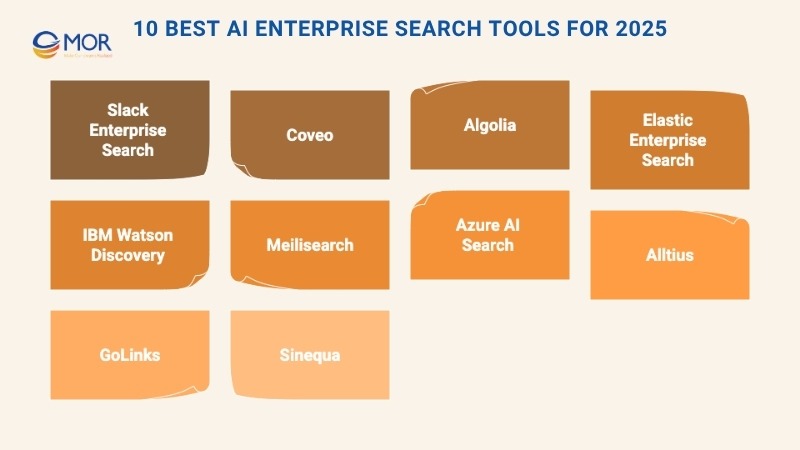
10 Best AI Enterprise Search Tools for 2025
Quick Comparison of the Top 10 AI Enterprise Search Tools for 2025
Alternative | Key features | Pricing | Best for |
Slack Enterprise Search | Chat plus file indexing, RAG answers, permissions | Included in Slack Enterprise Grid | Distributed teams |
Coveo | Unified indexing, AI relevance, dashboards | Quote on request | Ecommerce, service portals |
Algolia | Instant search, rules, analytics | Free tier then usage based | SaaS and retail apps |
Elastic Enterprise Search | Open-source core, scalable, connector pack | From $95 per month on Elastic Cloud | IT and data teams |
IBM Watson Discovery | NLP, OCR, facets | From $500 per month | Finance, legal, healthcare |
Meilisearch | Open-source, fast setup, custom ranking | Cloud starts $30 per month | Startups, developers |
Azure AI Search | Azure native, enrichment, semantics | From $73.73 per month | Azure centric enterprises |
Alltius | AI assistants, multi channel, analytics | Free trial then demo pricing | Support and onboarding |
GoLinks | Shortlinks, AI search, analytics | Free for small teams then $4 per user | Remote first companies |
Sinequa | Secure, 200+ connectors, personalization | Quote on request | Regulated industries |
How AI Enterprise Search Drives Real Productivity Gains
Time spent digging for information is time not spent doing the work that matters. That’s why AI enterprise search doesn’t just improve search. It speeds up outcomes. When teams can find what they need in seconds, everything moves faster.
- Cuts time spent searching across systems: Instead of jumping between apps, inboxes, and folders, employees get one intelligent query bar that pulls answers from everywhere.
- Delivers answers, not just results: Smart tools don’t just show files. They summarize content, highlight relevance, and even suggest next steps.
- Empowers teams to make faster decisions: When product managers, sales reps, or analysts don’t have to ask around for context, they can act with confidence and speed.
- Improves onboarding and customer support speed: New hires find old docs and team discussions without asking for links. Support agents find fix logs or FAQs while still chatting with customers.
- Reduces context-switching by surfacing insights in flow of work: Search lives where work happens: Slack, Teams, dashboards, so no need to open another tab or interrupt focus.
A real-world example? One marketing team used an enterprise ai search solution to cut meeting prep time by 60%. Instead of searching email threads or asking teammates, they typed “last year’s Q3 webinar deck” and got the exact file, slides, and Slack discussion within seconds.
Multiply that across dozens of teams, and the gains add up fast.

How AI Enterprise Search Drives Real Productivity Gains
How to Choose the Best AI Enterprise Search Tool
Not every tool fits every team. Before investing in enterprise search solutions, it’s smart to slow down and map what your teams really need.
1. Map your current knowledge ecosystem
Where does your company’s knowledge live? Think Slack, Confluence, Salesforce, file shares, Google Drive. List everything.
Ask: Which tools store our most important content? What do we search most often?
2. Define must-have integrations and access control needs
Some tools only search certain sources or lack deep permission handling. You’ll need secure, role-aware search across all systems.
Ask: Do we need Slack integration? Do we handle sensitive client or employee data?
3. Evaluate AI strength: language understanding, ranking, learning
Good tools go beyond keyword match. They understand meaning, infer context, and improve over time.
Ask: Can the tool handle natural queries like “2022 hiring plan”? Does it learn from behavior?
4. Prioritize tools that fit your team’s workflows
The best search lives where your people already work, not in a new tab they’ll forget to use.
Ask: Will our teams actually use this every day, or will it collect dust?
5. Look for low training needs and strong UX
Great ai powered enterprise search feels invisible. It just works.
Ask: Can users learn this without a demo? Is the experience fast and intuitive?
6. Consider pricing models based on data size and users
Don’t get surprised by scale. Some tools charge by records, others by queries or seat count.
Ask: Will this scale with us, or lock us into steep costs later?
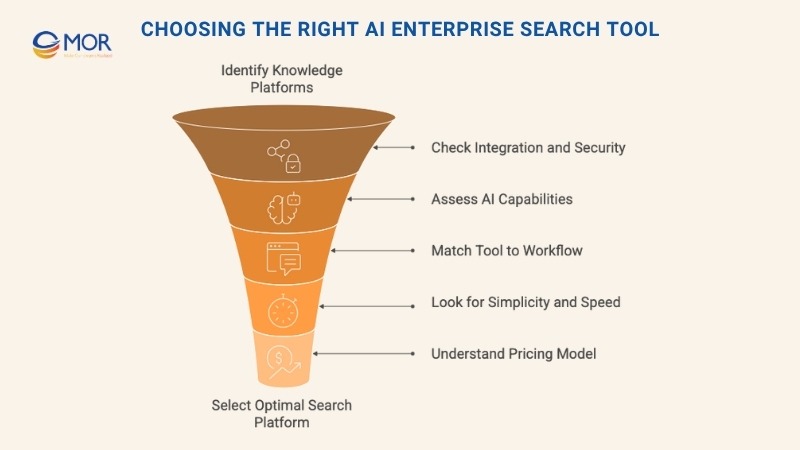
How to Choose the Best AI Enterprise Search Tool
MOR Software – Your Trusted Partner for AI Enterprise Search Success
If your teams are spending hours piecing together information from disconnected platforms, it’s time to rethink search. MOR Software builds AI enterprise search systems that actually fit your tech stack, team workflows, and long-term goals.
We serve global clients across Vietnam, Japan, South Korea, and Singapore. Our cross-functional teams combine AI expertise with a strong delivery model to create enterprise solutions that work in real business conditions.
What you can expect when working with MOR Software:
- Custom-built AI search tailored to your data and workflows: We design your system from the ground up. Whether you're on Salesforce, Microsoft 365, or a legacy intranet, we build smart lookup based on how your people actually work.
- End-to-end delivery from architecture to launch: Our team handles the full journey: planning, vector indexing, model deployment, and interface design. You don’t need to manage five vendors just to get a working search bar.
- Secure, compliant, and role-aware access control: Every search result respects user roles. We use encrypted connections, RBAC, and single sign-on for true enterprise-grade governance.
- Seamless integration with your current tech stack: Slack. SharePoint. Google Drive. Local databases. Whatever tools you use, we connect them into one federated search interface without disrupting your operations.
- Faster onboarding, better decisions, higher productivity: No more Slack messages asking, “Do you have that doc?” Smart search cuts the noise, supports better decisions, and gets new hires up to speed faster.
Ready to modernize your enterprise search? Contact us to explore a solution built just for you.
Conclusion
Choosing the right AI enterprise search tool means your team spends less time looking and more time acting. The best platforms bring answers directly into your flow of work, helping you move faster with confidence.
We’ve highlighted 10 of the top tools on the market, each solving different needs. Whether you run a startup or a global org, smart search matters. If your current systems feel disconnected or slow, it might be time to build something better. Contact MOR Software about a custom AI solution that delivers real results.
Rate this article
0
over 5.0 based on 0 reviews
Your rating on this news:
Name
*Email
*Write your comment
*Send your comment
1